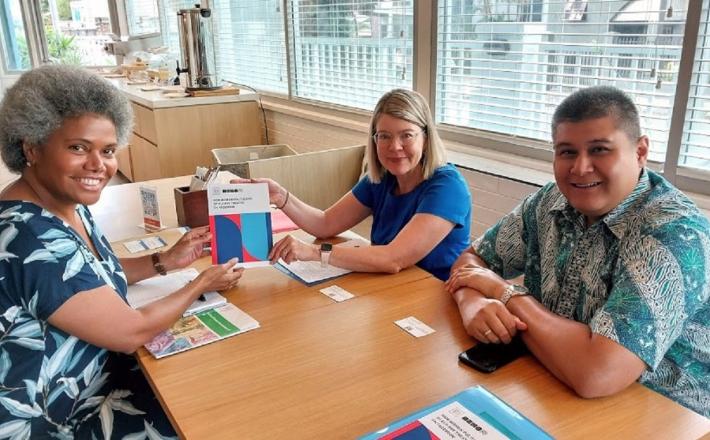Social media discourse a barrier to women candidates in Fiji?
Source: International IDEA
Fiji has concluded the 2023 elections and the results are in. Although the Melanesian country has achieved the change in power that many had hoped for, the picture is less rosy for women’s representation in parliament. Could the offensive treatment women politicians received on social media be to blame?
The Fijian Elections Office approved 343 candidates from 9 registered political parties and 2 independent candidates for the 2022 General Elections. Of the total, 56 women ran for the elections, the same number as in the 2018 elections, although as percentage the rate has dropped to 16.3 per cent of the total number of candidates compared to 24.0 per cent in 2018 elections. This decline in the percentage was attributed to the fact that 55 seats were up for grabs compared to 51 seats in 2018. Since the number of seats increased, the number of candidates per party had increased to 55.
[[{"fid":"21711","view_mode":"media_original","fields":{"format":"media_original","field_file_image_alt_text[und][0][value]":"International IDEA ","field_file_image_title_text[und][0][value]":"International IDEA "},"link_text":null,"type":"media","field_deltas":{"1":{"format":"media_original","field_file_image_alt_text[und][0][value]":"International IDEA ","field_file_image_title_text[und][0][value]":"International IDEA "}},"attributes":{"alt":"International IDEA ","title":"International IDEA ","class":"media-element file-media-original","data-delta":"1"}}]]
In the 2014 and 2018 elections, the percentage of women contesting the elections were 17.7 per cent and 24.0 per cent respectively. Eight women were elected to the parliament after the election in 2014 and a record ten women were elected to parliament in the 2018 election. The 2022 elections, which were the third election under new electoral system, had the lowest percentage (16.3 per cent) of women contesting the election compared to 2014 and 2018. The result of the 2022 elections saw only six women elected to parliament which is the lowest number so far under the new electoral system. There has been extensive work done to advance women’s leadership skills for several years in a bid to improve women’s representation in parliament by various stakeholders such as civil society organizations, development partners and political parties in Fiji.
Click here to read the full article published by International IDEA on 3 March 2023.

Fiji has concluded the 2023 elections and the results are in. Although the Melanesian country has achieved the change in power that many had hoped for, the picture is less rosy for women’s representation in parliament. Could the offensive treatment women politicians received on social media be to blame?
The Fijian Elections Office approved 343 candidates from 9 registered political parties and 2 independent candidates for the 2022 General Elections. Of the total, 56 women ran for the elections, the same number as in the 2018 elections, although as percentage the rate has dropped to 16.3 per cent of the total number of candidates compared to 24.0 per cent in 2018 elections. This decline in the percentage was attributed to the fact that 55 seats were up for grabs compared to 51 seats in 2018. Since the number of seats increased, the number of candidates per party had increased to 55.
[[{"fid":"21711","view_mode":"media_original","fields":{"format":"media_original","field_file_image_alt_text[und][0][value]":"International IDEA ","field_file_image_title_text[und][0][value]":"International IDEA "},"link_text":null,"type":"media","field_deltas":{"1":{"format":"media_original","field_file_image_alt_text[und][0][value]":"International IDEA ","field_file_image_title_text[und][0][value]":"International IDEA "}},"attributes":{"alt":"International IDEA ","title":"International IDEA ","class":"media-element file-media-original","data-delta":"1"}}]]
In the 2014 and 2018 elections, the percentage of women contesting the elections were 17.7 per cent and 24.0 per cent respectively. Eight women were elected to the parliament after the election in 2014 and a record ten women were elected to parliament in the 2018 election. The 2022 elections, which were the third election under new electoral system, had the lowest percentage (16.3 per cent) of women contesting the election compared to 2014 and 2018. The result of the 2022 elections saw only six women elected to parliament which is the lowest number so far under the new electoral system. There has been extensive work done to advance women’s leadership skills for several years in a bid to improve women’s representation in parliament by various stakeholders such as civil society organizations, development partners and political parties in Fiji.
Click here to read the full article published by International IDEA on 3 March 2023.